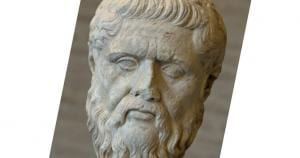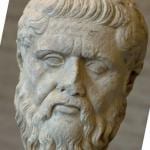What is going on?
If we wish to follow the Logos where He leads, we need to listen to critics, especially those with interesting things to say. Jeff Williams is a critic of metaphysics. A University of Chicago grad, he agreed to present his argument and I have posted it here unedited (except for some formatting and the title). As result of his rejection of metaphysics, he rejects objective moral law as an illusion.
Mr. Williams previously argued that Athens has no need of Jerusalem, which contributes nothing good to Western civilization. I responded and enjoyed the interaction immensely. Mr. Williams has taken the time to discuss Martin Heidegger, a philosopher not much in favor when I was in graduate school. I have enjoyed reading more Heidegger (alas in translation). As usual, I allowed his post to stand without comment for a time and now here is a response. Mr. Williams suggested to me that I had not gotten him right, so it seemed decent and in order to let him respond.
Thank you for this dialog Mr. Williams! May we ever follow the Logos wherever He leads.
And now Mr. Williams contra . . . Me!
Further Remarks on the Grounds for Morality
 John Mark, I thank you for the opportunity for us to hold what I think is an interesting and timely discussion; one that can illuminate both of our positions. I’ll briefly note that I sometimes cite Heidegger as a sort of shorthand for a preceding body of thought rather than go into a lengthy explanation of what has already been written. For me, Heidegger is a starting point, but after many decades of contemplation while watching the river flow along my home here under this bridge, I have forged my own path – one purposely at a distance from the mainstream. There is a deep tradition of thought behind certain words such as World, Being, Path, Dasein, and Ererignis that I often mistakenly assume to be known among readers. I will try to clarify some of that here.
John Mark, I thank you for the opportunity for us to hold what I think is an interesting and timely discussion; one that can illuminate both of our positions. I’ll briefly note that I sometimes cite Heidegger as a sort of shorthand for a preceding body of thought rather than go into a lengthy explanation of what has already been written. For me, Heidegger is a starting point, but after many decades of contemplation while watching the river flow along my home here under this bridge, I have forged my own path – one purposely at a distance from the mainstream. There is a deep tradition of thought behind certain words such as World, Being, Path, Dasein, and Ererignis that I often mistakenly assume to be known among readers. I will try to clarify some of that here.
You begin with a metaphysical assertion in arguing for metaphysical knowledge:
“…one need not accept that God’s “moral law” is an object separate from God’s own will. On this view, God, a person, has a will that God can share with other persons (humans, angels, and any other sentient life forms). There need not be a Platonic form of “moral law” out there apart from God.”
This will of god is itself a metaphysical assertion that one is not compelled to accept. If I were to ground my thinking solely in the physical this idea of god vanishes but the world is in no way altered. This indicates it is not an essential part of the world. It is really the same thing as a Platonic form but attributed to a specific metaphysical deity. As I explain below, I do not suggest there is no common ground for morality among people; much to the contrary. But as I have written before, the error of metaphysics is to split off this ground from physical Being and unnecessarily construct imaginary forms and sources for this essence. These imagined forms can take the appearance of objectivity because they are posited to exist prior to subjective judgment and meant to provide a common measure of truth. Common, however, does not necessarily imply objective. We share certain innate sensibilities, but there is no objective measure for beauty, food preferences, etc. Metaphysics is largely a reaction to the impossibility of logically grasping the true nature of Being in this world and rational idealism offers the alluring illusion of clarity. The universe, however, just isn’t that way. Finally, my point was not that the objective law would be outside God’s own will, but rather it would be outside and separate from human subjectivity, immutable and perfect.
So how do we determine what is good?
You wrote:
“God, being God, is by definition good. If so, then God’s “will” or “opinions” on morality would be co-extensive with moral goodness…The moral law would be the way God “experiences” the world, the moral choices, and so could be communicated to us.”
A major defect of metaphysical speculation is that we can simply define away any problem we encounter. Not all definitions of god are good, and many gods of the past were far from it. My reading of the Old Testament concludes an evil nature inhering in Yahweh. Metaphysical grounding of good is really built on no ground at all, but merely wisps of smoke dispersing as they rise toward the drawing room ceiling.
So, what is ground?
It’s earth in its fecundity. It’s blood and genes and the mysteries that drive it all. It is not fully explicable or knowable, but it does reveal certain aspects. Those aspects of revealed mystery are the solid grounding of knowledge. It is tempting to invent myth for those mysteries yet unrevealed, but the resulting metaphysics lose their grounding as mere empty speculation. Much better to remain silent before what cannot be spoken.
So how do we mine knowledge from this earthly ground?
You pointed to a priori knowledge such as mathematics (or logic), but how would you justify a priori knowledge as revealing truth outside our representations? You point to innate categories of the understanding, but these we have evolved to better adapt to our environment on the savannah. They simplified the world to icons that allowed us to better flee lions and catch gazelles. But these innate senses of number and logic need not actually exist outside this subjective understanding. We refer to it as objective because everybody has reference to it as an innate feature of our minds, but there is no valid way to expand that to actual existence outside our common subjectivity. Once we make the initial metaphysical move from A is A to A=A we have imposed a pure idea of number onto a world where it doesn’t exist. By doing so we have erased essence from the physical world and instead objectified it into equal and additive objects. With the erasure of essence inherent in A=A we can blithely say two lions when in reality it is this lion and that lion not identical in reality. And once we blind ourselves to that essence, we can never really know a lion. That essence was defined away as some metaphysical idea.
Kant described a priori propositions as empty. They can tell us much about how we organize our sense data, but beyond that they tell us nothing at all without sense data. To posit merely from empty reason and number is an imaginary exercise with no validity in respect to what actually exists.
You hint at a possibility of grounding truth when you write:
“If an objective moral truth existed, then our living in the world would bring us into contact with that moral truth. We would then recognize that (not unlike our experience of mathematical truths) with an “AHA!” moment. The outer reality triggers the inner response.”
It is a critical insight that we discover truth through experience, but in a very different way from recognizing mathematical truth. Mathematics is true by prior definition as an innate mental structure. What exists and how it exists cannot be known in that way, but. as you say, through experiencing its existence. The former is a set of rules for interpreting sense data, the latter is the experiencing of sense data. Reality is far too awe-inspiring, surprising, and mysterious to be deduced a priori.
This leads us to the problem of metaphysics. You suggested that I attribute the overcoming of metaphysics to Heidegger, but really it was a long process starting in the 17th century. The Stanford Encyclopedia of Philosophy writes in its section on Metaphysics:
“One might almost say that in the seventeenth century metaphysics began to be a catch-all category, a repository of philosophical problems that could not be otherwise classified as epistemology, logic, ethics or other branches of philosophy. (It was at about that time that the word ‘ontology’ was invented—to be a name for the science of being as such, an office that the word ‘metaphysics’ could no longer fill.)”
And from Bacon on the study of being itself steadily moved from the metaphysical to the physical as ontology. Kant derived ordering of sense data as the basis for knowledge of the world and distinguished it from the Transcendental Illusions created by reasoning beyond sense data. Hume’s skepticism rejected the existence of anything not learned through the senses. This led to the first real overcoming of metaphysics brought about by Schopenhauer and Nietzsche when they inverted Kant’s still metaphysical notion of Will as pure reason to Will as the animating mystery within the physical world itself. For Nietzsche, we experience it as the spirit of music. Heidegger further elaborated it as Being speaking poetically through man. This had two critical consequences:
1. As Being itself exists within physical existence, the ground of truth can only be accessed through the senses.
2. Reason cannot provide direct access to that truth because it necessarily creates the split between a noumenal thing-in-itself and our representation of this into an object. Through music or poetic experience, however, we become existentially connected in experience to the thing formerly thought of as noumenal, and thus directly conscious of belonging to Being.
So, how do we get to knowledge of morality?
Hume proposed that morality was an innate sensibility that we as a species refine over time. There is much to be said for that as a beginning of our answer to what is good. If morality is a matter of innate sensibility refined over time it is mutable according to the nature of our innate sensibility and explains how morality has progressed over the millennia. Objective morality, as that based on the Bible, would be immutable; but just as the eating of bugs would offend the sensibility of most people today, so does the Biblical harshness of the old testament. Our sense of morality is offended by genocide, an eye for an eye revenge, slavery, and the stoning of adulterers, heretics, and wayward youth. Alfred North Whitehead noted that in most religions there is a progression from a fearsome and harsh god toward a mild and forgiving one. I suggest that is best explained in a refinement in taste toward empathy and tolerance. In the West, this progress evolved more quickly and radically the further we moved away from Christianity, with a decided acceleration from the time of the Enlightenment. Were morality objective and immutable, we would still be mired in the primitive dictates of the Pentateuch.
We accept this moral sensibility as being good because we can do no other. It springs directly from our nature and contains the very possibility of morality in man. Although different people, and at different places and times, interpreted this innate sensibility differently, we consider empathy, fairness, caring and love in the general sense to be good because it is so determined in our nature.
What is the ultimate ground of this moral sensibility?
Science explains this in evolutionary terms. As our adaptative ability is improved through social cohesiveness and cooperation, so these innate impulses are selected for and survive. There are such examples throughout the animal world. Because science is an ontic explication of mechanism, however, it can tell us nothing of the ontology of morality, which with the overcoming of metaphysics requires a complete rethinking. And this is where you and I come surprisingly close in our thinking, although separated in the parallel universes of the metaphysical and the physical.
You write write:
“We experience any external reality: a brick, a beast, a moral moment. We question what we are experiencing, often getting our own experience wrong. Over time, however, enough of us who see well begin to understand bricks, beasts, and morality. We are hardwired by God to divide the world up correctly enough to still “get it.” As a result, we can speak to each other, translate other languages, and understand the world. There is an external reality that enables us to understand all kinds of external experiences, including moral ones.”
Almost exactly right. We learn through our experience and refine our sensibilities over time. What if we substitute Being for God? That leads directly to the question of intentionality in the universe, which even some physicists, such as Roger Penrose, are starting to take seriously. Pre-Enlightenment we automatically ascribed intention to a sentient god, but we have no ground for that metaphysical assertion. Being as physical existence is not a metaphysical assertion but our only knowable reality. And within it lies more mystery than we can ever fathom, so why invent another mystery? In Christianity man was made for a purpose, although it isn’t entirely clear what that purpose was. Perhaps Being contains the universal purpose that progresses in expression throughout time. Physical laws impel development toward ever more complexity. Inorganic chemicals evolve toward organic molecules and into genetic material. Eternal survival of this genetic material is the strongest force we have ever witnessed in this world, but who really can begin to imagine what this overwhelming intentionality really encompasses? Everything we are is an expression of what lie as potential in those uncanny genes. And what we are appears purposed for the contemplation and experience of this universe – Being in self-regard and self-experience.
Which brings us back to Logos. We speak to each other, but most meaningfully when we speak the poetry of Being. This is Logos in its fullest poetic and musical being. It is the logos that welcomes the revelations of Being into our shared world. It is why there is more wisdom in Shakespeare than in a thousand Theories of Relativity. It is the poetic word still dripping with the music straight from the earthly source. The sweetest song of the earthly sprite Ariel. It is Being not only speaking through us, but dancing through us with the electrons and quantum fields. All the universe is in its essence vibration – cosmic rhythm and harmony. Our own being resounds with sympathetic vibration – that is our consciousness in its fullest. Our life is the cosmic dance.












